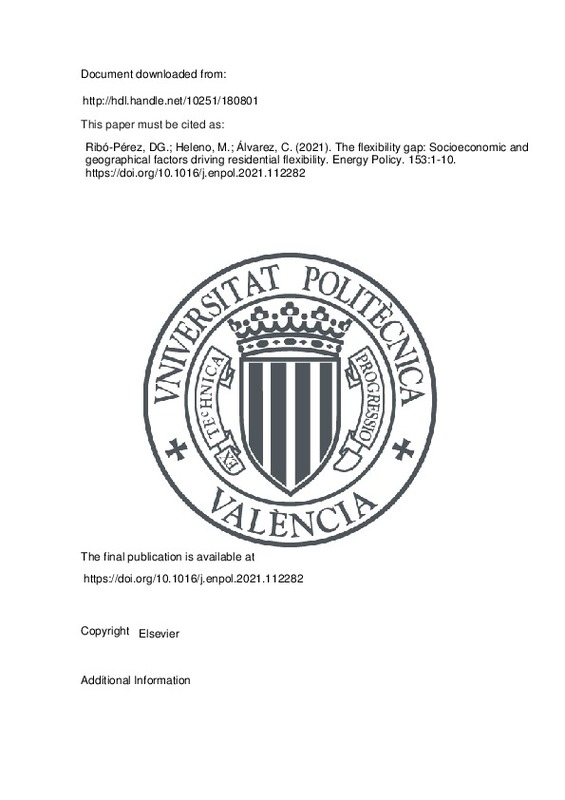JavaScript is disabled for your browser. Some features of this site may not work without it.
Buscar en RiuNet
Listar
Mi cuenta
Estadísticas
Ayuda RiuNet
Admin. UPV
The flexibility gap: Socioeconomic and geographical factors driving residential flexibility
Mostrar el registro sencillo del ítem
Ficheros en el ítem
| dc.contributor.author | Ribó-Pérez, David Gabriel
|
es_ES |
| dc.contributor.author | Heleno, Miguel
|
es_ES |
| dc.contributor.author | Álvarez, Carlos
|
es_ES |
| dc.date.accessioned | 2022-02-14T19:02:45Z | |
| dc.date.available | 2022-02-14T19:02:45Z | |
| dc.date.issued | 2021-06 | es_ES |
| dc.identifier.issn | 0301-4215 | es_ES |
| dc.identifier.uri | http://hdl.handle.net/10251/180801 | |
| dc.description.abstract | [EN] Residential consumers are moving to the center of electricity systems and their flexibility is seen as a key resource to integrate renewable energy sources and support the grid. However, residential flexibility capacities are not homogeneous, as they depend on household appliances, comfort patterns, occupancy, and climate conditions. Here, we calculate the technical flexibility capacities of 45 consumer types in mainland Spain, organised according to income and regional criteria. We show that flexibility gaps exist at both regional and socioeconomic (income) levels with flexibility differences of up to 10 times more capacity between the household groups from the lowest to the highest capacities. These geographical and socioeconomic gaps in flexibility can lead to distortions in national markets and have the potential to exclude citizens from the provision of flexibility services. Our results show in quantitative terms that a consumer-centered approach without considering correcting measures nor these gaps in drafting energy policies may lead to increasing inequality levels in the residential sector. Under an economic competitive paradigm, households with lower income levels or located in regions with lower flexibility potential may be excluded from the provision of flexibility to the detriment of households with larger potential, raising justice concerns in a flexibility-based energy transition. | es_ES |
| dc.description.sponsorship | This work was supported in part by the Spanish public administration under grant FPU 2016/00962 | es_ES |
| dc.language | Inglés | es_ES |
| dc.publisher | Elsevier | es_ES |
| dc.relation.ispartof | Energy Policy | es_ES |
| dc.rights | Reserva de todos los derechos | es_ES |
| dc.subject | Residential flexibility | es_ES |
| dc.subject | Energy inequality | es_ES |
| dc.subject | Energy transition | es_ES |
| dc.subject | Spain | es_ES |
| dc.subject.classification | INGENIERIA ELECTRICA | es_ES |
| dc.title | The flexibility gap: Socioeconomic and geographical factors driving residential flexibility | es_ES |
| dc.type | Artículo | es_ES |
| dc.identifier.doi | 10.1016/j.enpol.2021.112282 | es_ES |
| dc.relation.projectID | info:eu-repo/grantAgreement/MECD//FPU16%2F00962/ES/FPU16%2F00962/ | es_ES |
| dc.rights.accessRights | Abierto | es_ES |
| dc.contributor.affiliation | Universitat Politècnica de València. Departamento de Ingeniería Eléctrica - Departament d'Enginyeria Elèctrica | es_ES |
| dc.description.bibliographicCitation | Ribó-Pérez, DG.; Heleno, M.; Álvarez, C. (2021). The flexibility gap: Socioeconomic and geographical factors driving residential flexibility. Energy Policy. 153:1-10. https://doi.org/10.1016/j.enpol.2021.112282 | es_ES |
| dc.description.accrualMethod | S | es_ES |
| dc.relation.publisherversion | https://doi.org/10.1016/j.enpol.2021.112282 | es_ES |
| dc.description.upvformatpinicio | 1 | es_ES |
| dc.description.upvformatpfin | 10 | es_ES |
| dc.type.version | info:eu-repo/semantics/publishedVersion | es_ES |
| dc.description.volume | 153 | es_ES |
| dc.relation.pasarela | S\433116 | es_ES |
| dc.contributor.funder | Ministerio de Educación, Cultura y Deporte | es_ES |







![[Cerrado]](/themes/UPV/images/candado.png)

